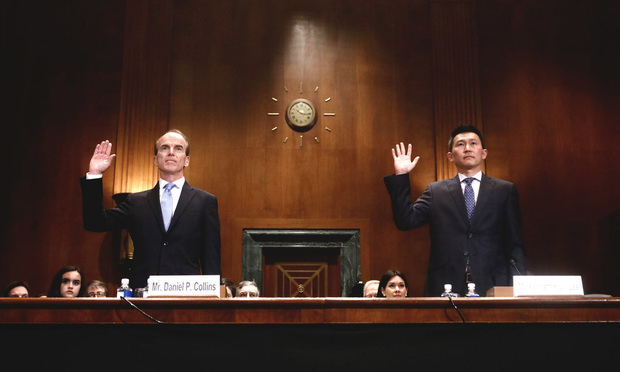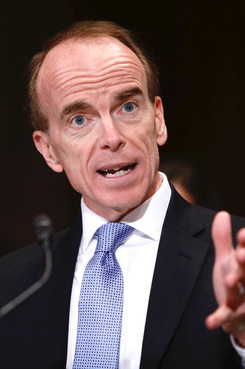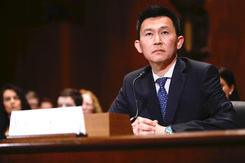2 California Ninth Circuit Nominees Get Confirmation Hearing Despite Senators' Objections
California's Democratic U.S. Senators. Sens. Dianne Feinstein and Kamala Harris came out publicly against President Donald Trump's nominations of Daniel Collins and Kenneth Lee to the Ninth Circuit, declining to return the so-called blue slips that indicate their sign-off.
March 13, 2019 at 02:08 PM
5 minute read
 Daniel Collins, left, and Kenneth Lee, right, testify before the Senate Judiciary Committee during their confirmation hearing to be U.S. Circuit Judges for the Ninth Circuit Court of Appeals, on Wednesday. Photo: Diego M. Radzinschi/ALM
Daniel Collins, left, and Kenneth Lee, right, testify before the Senate Judiciary Committee during their confirmation hearing to be U.S. Circuit Judges for the Ninth Circuit Court of Appeals, on Wednesday. Photo: Diego M. Radzinschi/ALM
During a confirmation hearing that was at times tense and emotional, two California-based nominees for the U.S. Court of Appeals for the Ninth Circuit faced questioning from home state senators who oppose their nominations.
California's Democratic Sens. Dianne Feinstein and Kamala Harris have come out publicly against President Donald Trump's nomination of Daniel Collins and Kenneth Lee to the Ninth Circuit, declining to return the so-called blue slips that indicate their sign-off.
 Daniel Collins testifies before the Senate Judiciary Committee during his confirmation hearing to be U.S. Circuit Judge for the Ninth Circuit Court of Appeals on Wednesday. Photo: Diego M. Radzinschi/ALM
Daniel Collins testifies before the Senate Judiciary Committee during his confirmation hearing to be U.S. Circuit Judge for the Ninth Circuit Court of Appeals on Wednesday. Photo: Diego M. Radzinschi/ALMCollins, a Los Angeles-based partner at Munger, Tolles & Olson, was an associate deputy attorney general during the George W. Bush administration and served a stint as an assistant U.S. attorney in the Central District of California. Feinstein and Harris said in January that concerns about “his temperament and rigidity were raised during his vetting,” relating to litigation positions he's taken in the past.
Lee, a Los Angeles-based partner at Jenner & Block, was previously an associate counsel in the George W. Bush White House. Feinstein and Harris said in January they opposed his nomination in part because he did not disclose “controversial writings” that “outlined extreme views on a number of important issues like affirmative action and voting rights” to judicial vettors. Earlier this month, the senators redoubled their opposition to Lee after they said that even more objectionable writings had been unearthed that were not previously disclosed. They called on the White House to withdraw his nomination and Senate Judiciary Chairman Lindsey Graham to hold off on holding Tuesday's hearing.
At the opening of the committee hearing Tuesday, Graham noted that an initial hearing date had been delayed because the White House initially missed a deadline to hand over materials for the nominees by the day, but as far as he was concerned, “the process has been fair.”
“I think there's been a lot of consultation here,” Graham said. “From my point of view it's time to move on.”
Feinstein, by contrast, said in her opening remarks that the decision to move ahead with the hearing would “effectively kill the blue slips for the circuit court” nominees, at least as long as Republicans control the Senate. To that, she warned her Republican colleagues: “Around here what goes around comes around.”
 Kenneth Lee testifies before the Senate Judiciary Committee during his confirmation hearing to be U.S. Circuit Judge for the Ninth Circuit Court of Appeals on Wednesday. Photo: Diego M. Radzinschi/ALM
Kenneth Lee testifies before the Senate Judiciary Committee during his confirmation hearing to be U.S. Circuit Judge for the Ninth Circuit Court of Appeals on Wednesday. Photo: Diego M. Radzinschi/ALMUnder questioning from Graham and Feinstein, Lee explained that he initially turned over more than 500 pages of writings to the Senate Judiciary, mostly collected from essays and columns he wrote as a college student. Another 70-plus pages that had been scanned and saved to someone else's private server were later discovered and handed over. Lee said that the newly discovered material covered similar topics as the previously disclosed writings.
“The topics were similar to what I had written before so in my mind I believed I had provided everything,” said Lee, before apologizing for the late additions.
Lee's writings were critical of some affirmative action policies, took a supportive position of a professor accused of sexual harassment, and defended President Ronald Reagan's response to the AIDS crisis. He said during testimony that “When' you're 18 or 19 you think you know everything even though you really don't,” Lee said. “I like to think I've matured as a person over the past two and half decades.”
Lee, whose parents immigrated from South Korea when he was four, repeatedly invoked his late father's belief that in America everyone stands a fair chance under the law during the testimony, often under questioning from friendly Republican senators. But Sen. Richard Blumenthal, D-Conn., invoked Lee's father to try to pin the nominee down when he sidestepped a question about whether Brown v. Board was decided correctly.
“What do you think your father would have said?” to that question, Blumenthal asked.
Lee responded that he and his father had never really discussed Constitutional issues.
Collins, meanwhile, faced questioning from Feinstein about whether provisions of the reauthorization of the Patriot Act that he worked on allowed the Bush administration to oust and replace nine U.S. Attorneys without Senate approval. Collins said that he had no intention of creating a way for the White House to sidestep the Senate when working on the policy and he never envisioned the scenario that ended up playing out.
“That was not something that I had really thought of,” Collins said.
This content has been archived. It is available through our partners, LexisNexis® and Bloomberg Law.
To view this content, please continue to their sites.
Not a Lexis Subscriber?
Subscribe Now
Not a Bloomberg Law Subscriber?
Subscribe Now
NOT FOR REPRINT
© 2025 ALM Global, LLC, All Rights Reserved. Request academic re-use from www.copyright.com. All other uses, submit a request to [email protected]. For more information visit Asset & Logo Licensing.
You Might Like
View All
Willkie Farr & Gallagher Drives Legal Challenge for Uber Against State's Rideshare Laws
5 minute read

Report: US Attorney E. Martin Estrada to Resign From California's Central District
3 minute read
After Solving Problems for Presidents, Ron Klain Now Applying Legal Prowess to Helping Airbnb Overturn NYC Ban
7 minute readTrending Stories
- 1'A Death Sentence for TikTok'?: Litigators and Experts Weigh Impact of Potential Ban on Creators and Data Privacy
- 2Bribery Case Against Former Lt. Gov. Brian Benjamin Is Dropped
- 3‘Extremely Disturbing’: AI Firms Face Class Action by ‘Taskers’ Exposed to Traumatic Content
- 4State Appeals Court Revives BraunHagey Lawsuit Alleging $4.2M Unlawful Wire to China
- 5Invoking Trump, AG Bonta Reminds Lawyers of Duties to Noncitizens in Plea Dealing
Who Got The Work
J. Brugh Lower of Gibbons has entered an appearance for industrial equipment supplier Devco Corporation in a pending trademark infringement lawsuit. The suit, accusing the defendant of selling knock-off Graco products, was filed Dec. 18 in New Jersey District Court by Rivkin Radler on behalf of Graco Inc. and Graco Minnesota. The case, assigned to U.S. District Judge Zahid N. Quraishi, is 3:24-cv-11294, Graco Inc. et al v. Devco Corporation.
Who Got The Work
Rebecca Maller-Stein and Kent A. Yalowitz of Arnold & Porter Kaye Scholer have entered their appearances for Hanaco Venture Capital and its executives, Lior Prosor and David Frankel, in a pending securities lawsuit. The action, filed on Dec. 24 in New York Southern District Court by Zell, Aron & Co. on behalf of Goldeneye Advisors, accuses the defendants of negligently and fraudulently managing the plaintiff's $1 million investment. The case, assigned to U.S. District Judge Vernon S. Broderick, is 1:24-cv-09918, Goldeneye Advisors, LLC v. Hanaco Venture Capital, Ltd. et al.
Who Got The Work
Attorneys from A&O Shearman has stepped in as defense counsel for Toronto-Dominion Bank and other defendants in a pending securities class action. The suit, filed Dec. 11 in New York Southern District Court by Bleichmar Fonti & Auld, accuses the defendants of concealing the bank's 'pervasive' deficiencies in regards to its compliance with the Bank Secrecy Act and the quality of its anti-money laundering controls. The case, assigned to U.S. District Judge Arun Subramanian, is 1:24-cv-09445, Gonzalez v. The Toronto-Dominion Bank et al.
Who Got The Work
Crown Castle International, a Pennsylvania company providing shared communications infrastructure, has turned to Luke D. Wolf of Gordon Rees Scully Mansukhani to fend off a pending breach-of-contract lawsuit. The court action, filed Nov. 25 in Michigan Eastern District Court by Hooper Hathaway PC on behalf of The Town Residences LLC, accuses Crown Castle of failing to transfer approximately $30,000 in utility payments from T-Mobile in breach of a roof-top lease and assignment agreement. The case, assigned to U.S. District Judge Susan K. Declercq, is 2:24-cv-13131, The Town Residences LLC v. T-Mobile US, Inc. et al.
Who Got The Work
Wilfred P. Coronato and Daniel M. Schwartz of McCarter & English have stepped in as defense counsel to Electrolux Home Products Inc. in a pending product liability lawsuit. The court action, filed Nov. 26 in New York Eastern District Court by Poulos Lopiccolo PC and Nagel Rice LLP on behalf of David Stern, alleges that the defendant's refrigerators’ drawers and shelving repeatedly break and fall apart within months after purchase. The case, assigned to U.S. District Judge Joan M. Azrack, is 2:24-cv-08204, Stern v. Electrolux Home Products, Inc.
Featured Firms
Law Offices of Gary Martin Hays & Associates, P.C.
(470) 294-1674
Law Offices of Mark E. Salomone
(857) 444-6468
Smith & Hassler
(713) 739-1250






